

Landmark legal case: Canadian precedent- international implications – RCI. Facebook has lost a battle requiring any lawsuits against it to be filed in it’s home turf nder California law.

A win for the Davids vs the Goliaths A woman in west coast British Columbia was surprised and angry to discover Facebook had used her image and the fact that she “liked” a product. for the intenet giant’s own commercial ends without her permission thereby violating her privacy rights. This had been in a now defunct Facebook advertising method called “sponsored stories”. Debbie Douez claimed that it violated the B.C. privacy act. A particular aspect of the case made it to the Supreme Court of Canada which handed down a precedent setting decision. Jeremy De Beer (BCL, LL.B,-Barr/Sol, B.Comm) is a professor of law at the Centre for Law Technology and Society (CLTS) at the University of Ottawa.
Listen The case against Facebook was brought by Deborah Douez of British Columbia. How academic at centre of Facebook scandal tried – and failed – to spin personal data into gold. As Aleksandr Kogan goes before parliament on Tuesday to account for his role in the controversial harvesting of Facebook data that was later used by Cambridge Analytica, he leaves behind him two unsuccessful companies and a once-promising academic career.

Kogan was a young psychologist fresh off a post-doctoral fellowship when he earned an appointment as a lecturer at Cambridge University in 2012 – a coup for any academic. Just six years later, the erstwhile Dr Spectre has been maligned in the press, mocked for his eccentric name change, and banned from the social network that he thought would provide him with the data to advance his research. He has also brought unwelcome scrutiny of Cambridge University’s other researchers, prompting Facebook’s Mark Zuckerberg to tell the US Congress that the company is looking into “whether there was something bad going on at Cambridge University overall”. In October 2017, GSR was dissolved. The company appears to have soured on Kogan, however. Facebook discovered 'security issue' affecting 50 million accounts. Facebook says it stored millions of passwords in plain text. SAN FRANCISCO (AP) — Facebook left millions of user passwords readable by its employees for years, the company said Thursday, an acknowledgement it offered after a security researcher posted about the issue online.

Photo: Pixabay / MGN. Facebook Stored Millions of Passwords in Plain Text. Here's How to Change Yours. If you're concerned about online security, you may have already reconsidered your relationship with Facebook.
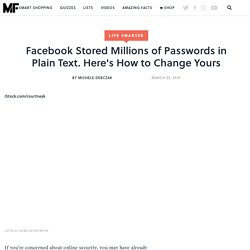
The social networking giant has earned a reputation for mishandling users' data and leaving them vulnerable to hacking. Now there's a new reason to reassess your profile: As KrebsOnSecurity reports, Facebook has been storing passwords in plain text since 2012, meaning they were easily readable and searchable for years for those with access to Facebook's internal workings. Any users should change their passwords as soon as possible. Over the last seven years, between 200 million and 600 million users had their passwords made vulnerable by the security flaw. Facebook's Massive Security Breach: Everything We Know.
A Very Special Techlinked Christmas. The 21 (and Counting) Biggest Facebook Scandals of 2018. Facebook privacy scandal explained. NEW YORK -- Facebook CEO Mark Zuckerberg prepares to face Congress on Tuesday, and No. 2 executive Sheryl Sandberg is on a media blitz as the company tries to contain swirling concerns about how it protects the data of its 2.2 billion members.
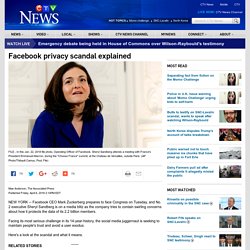
Facing its most serious challenge in its 14-year-history, the social media juggernaut is seeking to maintain people's trust and avoid a user exodus. Here's a look at the scandal and what it means. In mid-March, news broke that Cambridge Analytica, a London-based data-mining firm with ties to U.S. President Donald Trump, lifted the Facebook profiles of tens of millions of users without their permission in an attempt to sway elections. A former Cambridge Analytica employee, Christopher Wylie, said the firm got Facebook information through an app in order to build psychological profiles on a large portion of the U.S. electorate. It comes on the heels of a revelation that Russia used the service to meddle in U.S. elections. Facebook pulls controversial iPhone VPN app over data collection allegations. Facebook’s user privacy woes don’t seem to be letting up.
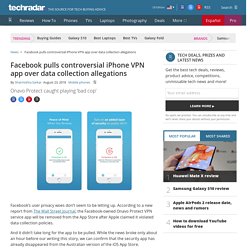
According to a new report from The Wall Street Journal, the Facebook-owned Onavo Protect VPN service app will be removed from the App Store after Apple claimed it violated data collection policies. And it didn’t take long for the app to be pulled. While the news broke only about an hour before our writing this story, we can confirm that the security app has already disappeared from the Australian version of the iOS App Store. "We work hard to protect user privacy and data security throughout the Apple ecosystem," an Apple spokesperson said with regards to the decision. On Thanksgiving Eve, Facebook quietly admitted to hiring dirty tricksters to publish an anti-Semitic Soros hoax smearing its critics.
When the New York Times published its insider report detailing how Facebook executives had hired the Republic PR firm Definers, known for it dirty tricks campaigns, and then directed it to spread lies linking Facebook's critics to the anti-Semitic conspiracy theory that George Soros secretly directs political campaigns in the US and abroad, Facebook lied and said that the New York Times was wrong.
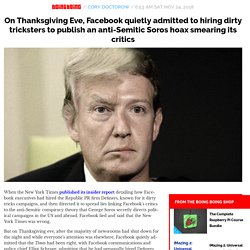
But on Thanksgiving eve, after the majority of newsrooms had shut down for the night and while everyone's attention was elsewhere, Facebook quietly admitted that the Times had been right, with Facebook communications and policy chief Elliot Schrage, admitting that he had personally hired Definers and that the company had directed them to investigate and publish about Soros.
Schrage is now leaving Facebook, and claims that the decision to do so pre-dated the scandal. Here is Schrage's memo. Did we ask them to do work on George Soros? Delay, Deny and Deflect: How Facebook’s Leaders Fought Through Crisis. In the final months of Mr. Trump’s presidential campaign, Russian agents escalated a yearlong effort to hack and harass his Democratic opponents, culminating in the release of thousands of emails stolen from prominent Democrats and party officials. Facebook had said nothing publicly about any problems on its own platform. But in the spring of 2016, a company expert on Russian cyberwarfare spotted something worrisome. He reached out to his boss, Mr. Stamos. Mr. Mr. Mr. Ms. Facebook Failed to Police How Its Partners Handled User Data. Facebook Is Recycling Your Likes To Promote Stories You've Never Seen To All Your Friends. If Facebook's new Graph Search feature has you thinking a little harder about what you've "liked" for fear that an ironic dalliance in years past could come back to embarrass you, here's one more thing to worry about.
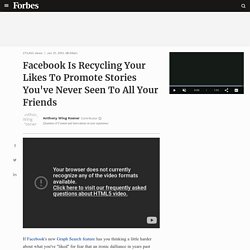
Facebook is now recycling users' Likes and using them to promote "Related Posts" in the news feeds of the user's friends. And one more thing, the users themselves have possibly never seen the story, liked the story or even know that it is being promoted in their name. This was brought to my attention through a story by Minneapolis developer Craig Condon in which he accuses Facebook of "impersonating people without their consent.
" See video above for his lucid documentation of the phenomenon, including the use of a fabricated account as a demonstration tool. Condon continues, "most individuals have no idea this is happening. "This goes beyond just advertising on a user’s behalf," Condon writes. Could this technique explain all of the mysterious Likes by Meisler's friends?